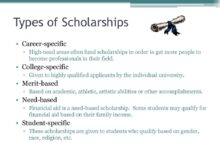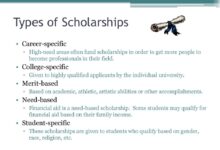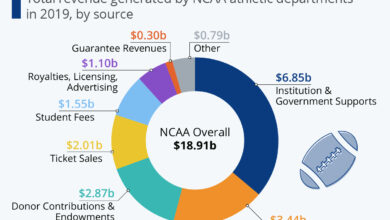How To Apply For Scholarships Online (Fast And Easy)
How to Apply for Scholarships Online (Fast and Easy) opens the door to a world of opportunities for students seeking financial aid, providing a roadmap to navigate the scholarship application process with ease and efficiency.
From understanding the importance of scholarships to preparing necessary documents and submitting applications, this guide covers all aspects of securing funding for education online.
Understand the Scholarship Process
Scholarships play a crucial role in helping students financially by providing funds to cover educational expenses. They are essentially financial aids awarded to students based on various criteria such as academic achievements, financial need, extracurricular activities, and more.
Types of Scholarships Available Online
- Merit-based Scholarships: These scholarships are awarded to students based on their academic performance, achievements, talents, or other accomplishments.
- Need-based Scholarships: These scholarships are awarded to students based on their financial need, as determined by their family’s income and other financial factors.
- Essay Scholarships: These scholarships require students to submit essays on specific topics to demonstrate their writing skills and critical thinking abilities.
- Minority Scholarships: These scholarships are designed to support students from underrepresented minority groups and promote diversity in education.
Application Process for Scholarships
When applying for scholarships online, it is important to carefully read and follow the instructions provided by each scholarship program. Key elements of a successful application include submitting all required documents, such as transcripts, recommendation letters, and financial information, by the deadline. It is also essential to write a compelling scholarship essay that highlights your achievements, goals, and reasons for applying.
Writing a Compelling Scholarship Essay
- Start by brainstorming ideas and creating an outline for your essay.
- Focus on a specific topic or prompt provided by the scholarship program.
- Showcase your achievements, goals, and personal experiences that make you a strong candidate for the scholarship.
- Be authentic, genuine, and passionate in your writing to make a lasting impression on the selection committee.
Securing Strong Recommendation Letters
- Choose recommenders who know you well and can speak to your strengths and achievements.
- Provide your recommenders with all the necessary information, such as your resume, academic records, and the scholarship requirements.
- Follow up with your recommenders to ensure they submit their letters on time.
Maintaining Academic Excellence for Scholarship Retention
To retain scholarships, it is crucial to maintain a high level of academic performance throughout your studies. This includes attending classes regularly, completing assignments on time, and actively participating in academic activities. By demonstrating academic excellence, you show scholarship providers that their investment in you is worthwhile.
Research Scholarship Opportunities
Researching scholarship opportunities is a crucial step in the application process. By effectively searching for scholarships online, you can increase your chances of finding the right ones for you. Here are some tips on how to do it:
Checking Eligibility Criteria
When looking for scholarships, always make sure to carefully check the eligibility criteria for each one. This will help you focus on scholarships that you are actually eligible for, saving you time and effort.
Importance of Deadlines
Deadlines play a significant role in the scholarship application process. Missing a deadline could mean losing out on a great opportunity. It is essential to keep track of all deadlines and ensure you submit your applications on time.
Popular Websites for Scholarship Search
– Fastweb
– Scholarships.com
– College Board
– Chegg
– Peterson’s
Tailoring Scholarship Applications
Each scholarship will have specific eligibility requirements. To increase your chances of success, tailor your applications to match these requirements. Highlight your relevant skills, experiences, and achievements that align with what the scholarship committee is looking for.
Avoiding Missed Deadlines
Missing scholarship application deadlines can have serious consequences, as it may result in your application not being considered. To avoid this, create a calendar with all the important dates, set reminders, and make sure to give yourself enough time to complete and submit your applications.
Prepare Necessary Documents
When applying for scholarships online, it is crucial to have all the necessary documents ready to streamline the process and increase your chances of success. Organizing and keeping track of these documents is key to a successful application. Below are the common documents required for scholarship applications and tips on how to prepare them effectively.
Common Documents for Scholarship Applications
- Transcripts: Most scholarships require academic transcripts to verify your grades and academic performance. Ensure your transcripts meet the minimum GPA requirements specified by the scholarship provider.
- Recommendation Letters: These letters provide insight into your character, achievements, and potential. Request letters from teachers, mentors, or employers who can speak to your qualifications for the scholarship.
- Essays: Many scholarship applications require essays to assess your writing skills, goals, and aspirations. Make sure to adhere to word limits and any specific guidelines provided by the scholarship committee.
Organizing and Requesting Documents
- Keep all your documents in one place to easily access them when needed.
- Create a checklist of required documents for each scholarship application to ensure you don’t miss anything.
- When requesting recommendation letters, provide your recommenders with detailed information about the scholarship, the deadline, and any specific qualities or achievements you’d like them to highlight.
Examples of Well-Written Essays
- Sample Essay 1: “My Journey to Pursuing a Degree in Computer Science”
- Sample Essay 2: “Overcoming Adversity: How I Found Success Through Perseverance”
Create a Compelling Scholarship Application
Tailoring your scholarship application to specific requirements is crucial in increasing your chances of success. Here are some tips to help you create a strong application:
Writing a Strong Scholarship Essay or Personal Statement
- Start by carefully reading the essay prompt or guidelines provided by the scholarship committee.
- Highlight your unique qualities, experiences, and accomplishments that align with the scholarship’s goals.
- Craft a compelling narrative that showcases your passion, drive, and future goals.
- Ensure your writing is clear, concise, and free of errors by revising and editing multiple times.
- Showcase your personality and voice to make your essay memorable and engaging for the readers.
Showcasing Achievements and Experiences in the Application
- Include specific examples of how your achievements and experiences have shaped your academic and personal growth.
- Quantify your accomplishments with facts, figures, and outcomes to demonstrate the impact you have made.
- Highlight any leadership roles, community service, or extracurricular activities that showcase your dedication and commitment.
- Connect your experiences to the scholarship’s mission or values to show alignment with the organization’s goals.
- Use your application as an opportunity to present a well-rounded picture of who you are beyond your academic achievements.
Secure Strong Letters of Recommendation
When applying for scholarships, securing strong letters of recommendation is crucial to strengthen your application. These letters provide insight into your character, achievements, and potential, giving scholarship committees a well-rounded view of who you are as a candidate.
Approaching Potential Recommenders
When approaching potential recommenders for letters of recommendation, it is important to choose individuals who know you well and can speak to your strengths and accomplishments. Consider reaching out to teachers, professors, employers, or mentors who can provide detailed and personalized insights into your character and abilities.
- Explain why you are applying for the scholarship and how their recommendation would support your application.
- Provide them with relevant information about the scholarship requirements and deadlines.
- Ask if they would be willing to write a strong letter of recommendation on your behalf.
Choosing the Right Recommenders
Different scholarships may require recommendations from specific individuals based on the criteria of the award. For academic scholarships, consider asking teachers or professors who can speak to your academic achievements and potential. For leadership scholarships, seek recommendations from supervisors or mentors who can attest to your leadership skills and impact.
- Consider the requirements of each scholarship and select recommenders who can address those specific criteria.
- Choose individuals who can provide unique perspectives on your abilities and accomplishments.
Tailoring Requests for Letters of Recommendation
When requesting letters of recommendation, tailor your approach based on the requirements of each scholarship. Provide recommenders with relevant information about the scholarship criteria and highlight different qualities or experiences that are important for that particular award.
- Emphasize specific achievements or skills that are relevant to the scholarship criteria.
- Ask recommenders to focus on certain aspects of your character or accomplishments that align with the scholarship requirements.
Following Up with Recommenders
After requesting letters of recommendation, follow up with recommenders to ensure that the letters are submitted on time and meet the scholarship deadlines. Provide gentle reminders closer to the deadline and express your gratitude for their support in the application process.
- Send a thank-you note to recommenders for taking the time to write a letter on your behalf.
- Check in periodically to confirm that the letters have been submitted and inquire about any additional information needed.
Importance of Diverse Perspectives
It is essential to request recommendation letters from individuals who can speak to different aspects of your character and accomplishments. Seek recommendations from a variety of sources to provide scholarship committees with a well-rounded view of your strengths and potential.
- Choose recommenders who can highlight different qualities, such as academic achievements, leadership skills, community involvement, or personal attributes.
- Ensure that each recommender can provide a unique perspective that adds depth to your application.
Submitting the Application
When it comes to submitting your scholarship application, it is crucial to pay attention to detail and follow the necessary steps accurately. This process can significantly impact your chances of receiving the scholarship you are applying for.
Creating an Account on the Scholarship Application Platform
- Visit the scholarship application platform’s website and look for the “Create an Account” or “Sign Up” option.
- Fill out the required information accurately, including your name, contact details, and academic background.
- Choose a strong password to secure your account and make sure to verify your email address if required.
Filling out Personal Information
- Double-check all personal information you provide to ensure accuracy.
- Avoid using abbreviations or nicknames that may cause confusion.
- Keep your information secure by not sharing sensitive details unnecessarily.
Uploading Necessary Documents
- Scan and upload your transcripts, recommendation letters, and essays in the required format (PDF, Word document, etc.).
- Ensure that all documents are clear and legible for the scholarship committee to review.
- Label each document appropriately to avoid any confusion.
Tracking Application Progress
- After submitting your application, check for a confirmation email or notification on the platform.
- Keep track of any updates or requests for additional information from the scholarship committee.
- Regularly log in to your account to see if there are any new messages or notifications regarding your application.
Reviewing and Proofreading
- Before final submission, carefully review your application for any errors or missing information.
- Proofread your essays and personal statements to ensure clarity, coherence, and correct grammar.
- Avoid common mistakes such as spelling errors, inconsistent formatting, and vague statements.
Follow Up on Applications
Following up on scholarship applications is a crucial step in the process to ensure that your application is being reviewed and to stay informed about potential outcomes. It is important to track the status of your applications to know if any additional information is required or if any issues have arisen.
Tracking Application Statuses
- Regularly check your email and online portals for any updates on your application status.
- Keep a spreadsheet or document with details of each scholarship applied to, including deadlines, requirements, and status.
- Reach out to the scholarship providers if there are any delays in receiving a response or if you have not heard back within the expected timeframe.
Following Up with Providers
- If you need to follow up with scholarship providers, be polite and professional in your communication.
- Email is usually the preferred method of communication, but you can also consider calling if necessary.
- Inquire about the timeline for decisions and ask if there is any additional information they need from you.
Staying Organized
- Organize all your application materials in folders or digital files to easily access them when needed.
- Set reminders for follow-up dates or deadlines to ensure you stay on track with your applications.
- Keep a record of all communications with scholarship providers for future reference.
Avoiding Common Mistakes
When applying for scholarships online, it is crucial to avoid common mistakes that can hinder your chances of success. Proofreading applications for errors or inconsistencies and submitting complete and accurate information are key steps in ensuring a strong scholarship application.
Avoid These Common Mistakes:
- Missing deadlines: Be sure to note deadlines for scholarship applications and submit yours on time to avoid disqualification.
- Ignoring eligibility criteria: Make sure you meet all the requirements before applying to save time and effort.
- Not following instructions: Carefully read and adhere to all instructions provided for the application process.
- Overlooking typos and errors: Proofread your application multiple times to catch any mistakes before submitting.
- Providing incomplete information: Fill out all required fields and provide all necessary documentation to avoid rejection.
Tips for Proofreading Applications:
Take your time to review each section of your application for spelling, grammar, and formatting errors.
- Ask someone else to proofread your application for a fresh perspective.
- Use spelling and grammar check tools to catch any overlooked mistakes.
- Read your application out loud to identify any awkward phrasing or inconsistencies.
Importance of Submitting Complete and Accurate Information:
Submitting complete and accurate information is crucial to present yourself in the best light possible to scholarship committees. Inaccurate information can raise doubts about your credibility and attention to detail, potentially affecting your chances of receiving the scholarship.
Utilize Scholarship Search Engines
When looking for scholarship opportunities, utilizing scholarship search engines can greatly help students in finding relevant and suitable options. These platforms gather information on various scholarships available for different fields of study, locations, and eligibility requirements, making the search process more efficient and effective.
Reputable Scholarship Search Engines
- Fastweb: Fastweb is a popular scholarship search engine that allows students to filter search results based on their field of study, location, and other criteria. It also provides personalized scholarship recommendations based on the user’s profile.
- Scholarships.com: Scholarships.com is another reputable platform where students can search for scholarships and filter results based on specific requirements. It offers a wide range of scholarship opportunities for students.
- College Board Scholarship Search: College Board’s scholarship search engine helps students find scholarships that match their profile and criteria. It allows users to create a comprehensive profile to receive personalized recommendations.
Creating a Comprehensive Profile
When using scholarship search engines, it is essential for students to create a detailed profile to increase their chances of receiving personalized recommendations. Here are the steps to create a comprehensive profile:
- Provide accurate information about your academic background, interests, and goals.
- Add details about your field of study, extracurricular activities, and any achievements or awards.
- Update your profile regularly to reflect any changes in your academic or personal information.
Setting Up Alerts and Notifications
To stay updated on new scholarship opportunities, students can set up alerts or notifications on these platforms. Here are some strategies to ensure you don’t miss out on potential scholarships:
- Create alerts for specific keywords related to your field of study or interests.
- Set up notifications for new scholarship listings that match your profile.
- Regularly check your email or the scholarship search engine platform for updates on new opportunities.
Maximizing Chances of Success
Regularly updating your profile and checking for new scholarships on these search engines are crucial steps to maximize your chances of success. By staying proactive and keeping your profile information current, you can increase the likelihood of finding relevant scholarship opportunities that align with your academic and personal goals.
Consider Alternative Scholarship Sources
Consider exploring alternative sources of scholarships to increase your chances of securing financial aid for your education. These sources may offer unique opportunities that are not widely advertised on traditional online platforms.
Local Resources
- Local Libraries, Community Centers, or Career Fairs: These places often have information on scholarships specific to your area or community.
Industry-Specific Scholarships
- Research Industries or Companies: Look into companies or industries related to your field of study for scholarship opportunities.
- Professional Associations: Check if professional organizations in your desired field offer scholarships to members.
Networking and Outreach
- Alumni Networks or Mentors: Reach out to alumni or mentors for advice on potential scholarship opportunities.
Government and Non-Profit Organizations
- Government Agencies: Investigate if government agencies offer scholarships for specific demographics or areas of study.
- Non-Profit Organizations: Look into scholarships provided by non-profit organizations that align with your academic or career goals.
Scholarship Interview Preparation
Preparing for a scholarship interview is a crucial step in the application process. It provides the opportunity to showcase your personality, achievements, and goals to the scholarship provider. Here are some tips on how to prepare effectively for scholarship interviews:
Researching the Scholarship Provider
- Research the scholarship provider to understand their values, mission, and goals.
- Visit the organization’s website and social media platforms to gather information.
- Identify key individuals within the organization and their roles.
Preparing Relevant Questions
- Prepare thoughtful questions to ask the interviewers about the scholarship and the organization.
- Demonstrate your interest and knowledge about the scholarship opportunity.
- Ask about the selection process, expectations, and potential opportunities for recipients.
Presenting Yourself Confidently and Professionally
- Dress professionally and appropriately for the interview.
- Practice common interview questions and answers to build confidence.
- Highlight your achievements, experiences, and goals during the interview.
- Maintain good eye contact and engage actively with the interviewers.
- Show enthusiasm and passion for your academic and career goals.
Scholarship Renewal Process
When it comes to renewing scholarships for multiple years, it is essential to understand the process and requirements to maintain eligibility. Here are some tips to help you navigate the scholarship renewal process successfully.
Meeting Renewal Requirements
- Review the renewal criteria: Make sure you are aware of the specific requirements to renew your scholarship, such as maintaining a certain GPA or completing a certain number of credit hours.
- Stay organized: Keep track of important deadlines and submission requirements to ensure you meet all renewal criteria on time.
- Seek assistance if needed: If you are facing challenges meeting the renewal requirements, don’t hesitate to reach out to the scholarship provider for guidance and support.
Maintaining Eligibility
- Focus on academic performance: Strive to maintain a strong GPA and actively participate in extracurricular activities to demonstrate your commitment to your education.
- Engage in service activities: Some scholarships may require you to engage in community service or volunteer work. Make sure to fulfill these obligations to maintain eligibility for renewal.
- Communicate with the scholarship provider: If you encounter any obstacles that may affect your eligibility for renewal, communicate openly with the scholarship provider to discuss potential solutions.
Importance of Fulfilling Obligations
- Build a positive reputation: Fulfilling academic or service obligations for scholarship renewals showcases your dedication and reliability, which can benefit you in future endeavors.
- Maximize opportunities: By meeting renewal requirements, you increase your chances of securing funding for additional years of study, reducing financial stress and allowing you to focus on your academic goals.
- Demonstrate gratitude: Fulfilling obligations for scholarship renewals is a way to show appreciation for the support you have received and to contribute positively to the scholarship program.
Scholarships for Specific Fields or Majors
When it comes to scholarships, students majoring in STEM fields have a unique advantage as there are many scholarships exclusively tailored for them. These scholarships can provide financial assistance and recognition for students pursuing degrees in science, technology, engineering, and mathematics.
Research scholarships available exclusively for students majoring in STEM fields.
- Look for scholarships offered by organizations, foundations, and universities specifically for STEM students.
- Check with professional associations related to your field of study for scholarship opportunities.
The specific GPA requirements and prerequisite courses needed for STEM scholarships.
- Understand the minimum GPA requirements set by each scholarship provider.
- Ensure you have completed the necessary prerequisite courses for the STEM scholarships you are applying for.
Provide a step-by-step guide on how to craft a compelling essay for STEM-focused scholarship applications.
- Start by researching the scholarship organization and understanding their mission and values.
- Highlight your passion for STEM fields, your achievements, and career goals in your essay.
- Showcase how receiving the scholarship will help you further your education and contribute to the STEM community.
Create a table comparing different STEM scholarships, including award amounts and application deadlines.
| Scholarship Name | Award Amount | Application Deadline |
|---|---|---|
| Society of Women Engineers Scholarship | $5,000 | March 15 |
| National Science Foundation Scholarship | $10,000 | May 1 |
Offer tips on securing strong letters of recommendation tailored to STEM scholarship applications.
- Choose recommenders who can speak to your academic achievements and passion for STEM fields.
- Provide your recommenders with specific examples of your work and accomplishments to include in their letters.
Seek Guidance from School Counselors or Advisors
School counselors or advisors play a crucial role in the scholarship application process. They can provide valuable guidance, support, and resources to help students navigate the complex world of scholarships. Here are some tips on how to make the most of their assistance:
Scheduling Meetings with Counselors
- Reach out to your school counselor or advisor to schedule a meeting specifically to discuss scholarships.
- Come prepared with a list of scholarships you are interested in or any questions you may have.
- Be respectful of their time and be proactive in setting up appointments well in advance of application deadlines.
Assistance with Research and Application
- Counselors can help you identify scholarship opportunities that align with your interests, background, and academic achievements.
- They can guide you on how to effectively complete scholarship applications, ensuring all necessary documents are submitted on time.
- They may also have insight into specific scholarships that are not widely advertised, giving you a competitive edge.
Securing Scholarships
- Counselors can provide tips on how to stand out in scholarship applications and make a compelling case for why you deserve the award.
- They can assist in obtaining strong letters of recommendation and crafting a well-written personal statement.
- They may offer support in preparing for scholarship interviews, if required, to boost your chances of success.
Celebrate Success and Learn from Rejections
Celebrating successful scholarship awards and achievements is essential to acknowledge your hard work and dedication. It serves as a motivation to continue striving for excellence in your academic pursuits. On the other hand, learning from rejection is equally important. Rejections provide valuable feedback that can help you improve your future scholarship applications. Embrace both success and rejection as part of the learning process in your scholarship journey.
Tips for Staying Motivated and Persistent
- Reflect on your achievements: Take time to celebrate each success, whether big or small, to boost your morale and confidence.
- Seek feedback: When faced with rejection, ask for feedback from scholarship committees to understand areas for improvement and make necessary adjustments.
- Stay positive: Maintain a positive mindset throughout the application process, focusing on your strengths and learning opportunities.
- Set goals: Establish clear scholarship goals and objectives to stay motivated and driven towards achieving them.
- Stay organized: Keep track of deadlines, requirements, and application progress to avoid last-minute stress and ensure timely submissions.
Conclusive Thoughts
In conclusion, mastering the art of applying for scholarships online not only eases the financial burden of education but also opens doors to new possibilities and opportunities for academic and personal growth. By following these steps and tips, students can streamline the scholarship application process and increase their chances of success.









